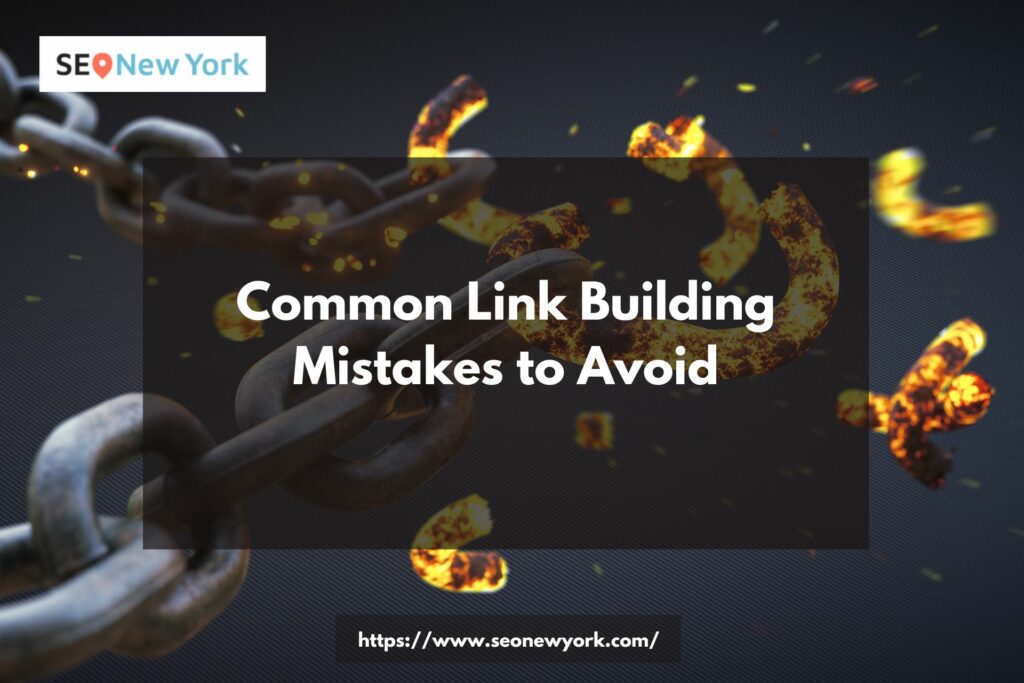Introduction
Link building is a crucial aspect of any successful SEO strategy, but it’s not without its pitfalls. In this article, we’ll delve into the common mistakes that many website owners make in their link-building efforts. Understanding and avoiding these pitfalls can significantly enhance your website’s visibility and authority.
The Importance of Quality Links
Before we explore the mistakes, let’s emphasize the importance of quality links. Search engines consider backlinks as votes of confidence in a website’s credibility. However, not all links are created equal. Quality surpasses quantity in the world of link building.
1. Neglecting the Relevance Factor
The Mistake
One common blunder is pursuing links from unrelated websites. While the number of links is essential, relevance plays a pivotal role in determining their impact. Links from relevant, high-authority sites carry more weight in the eyes of search engines.
The Solution
Focus on building relationships with websites in your niche. Seek links that make sense contextually and enhance the user’s experience.
2. Quantity Over Quality
The Mistake
Some website owners fall into the trap of pursuing sheer volume rather than quality when it comes to link building. Mass link-building tactics, such as buying links or participating in link farms, can result in penalties from search engines.
The Solution
Prioritize quality over quantity. Invest time in building organic links from authoritative sources, even if the process takes longer.
3. Ignoring Anchor Text Diversity
The Mistake
Over-optimizing anchor text is a prevalent mistake. Using the same anchor text repeatedly can raise red flags for search engines, potentially leading to penalties.
The Solution
Diversify your anchor text. Use a mix of branded, generic, and long-tail anchor text to create a natural and varied link profile.
4. Neglecting Internal Linking
The Mistake
While external links are crucial, internal links should not be overlooked. Neglecting internal linking can hinder your website’s overall SEO performance.
The Solution
Strategically incorporate internal links to connect related content within your website. This not only aids in SEO but also enhances user navigation.
5. Disregarding Broken Links
The Mistake
Failing to monitor and fix broken links on your website can harm user experience and hinder your SEO efforts.
The Solution
Regularly audit your website for broken links and address them promptly. Tools like Google Search Console can help identify and resolve these issues.
6. Impatience with Results
The Mistake
Expecting immediate results from link-building efforts is unrealistic. Patience is key in the world of SEO.
The Solution
Understand that building a robust link profile takes time. Focus on consistent, sustainable efforts rather than seeking quick fixes.
7. Unoptimized Anchor Text
The Mistake
Using generic anchor text like “click here” or “read more” can miss valuable SEO opportunities.
The Solution
Optimize anchor text by including relevant keywords. This not only improves SEO but also provides context to users.
Conclusion
In the dynamic landscape of SEO, avoiding common link-building mistakes is crucial for sustainable growth. By prioritizing relevance, quality, and diversity in your link-building strategy, you can create a robust online presence.
FAQs
Q1: How long does it take to see results from link-building efforts?
A: The timeline for seeing results varies, but it’s essential to focus on long-term, sustainable strategies.
Q2: Can I buy links to boost my website’s authority?
A: Buying links is a risky strategy that can lead to penalties from search engines. It’s best to focus on organic link-building methods.
Q3: Is internal linking as important as external linking?
A: Yes, internal linking is crucial for both SEO and enhancing user navigation within your website.
Q4: What tools can help identify broken links on my website?
A: Tools like Google Search Console and various online crawlers can assist in identifying and fixing broken links.
Q5: How often should I audit my website for broken links?
A: Regular audits, at least quarterly, are recommended to ensure a smooth user experience and maintain SEO health.
